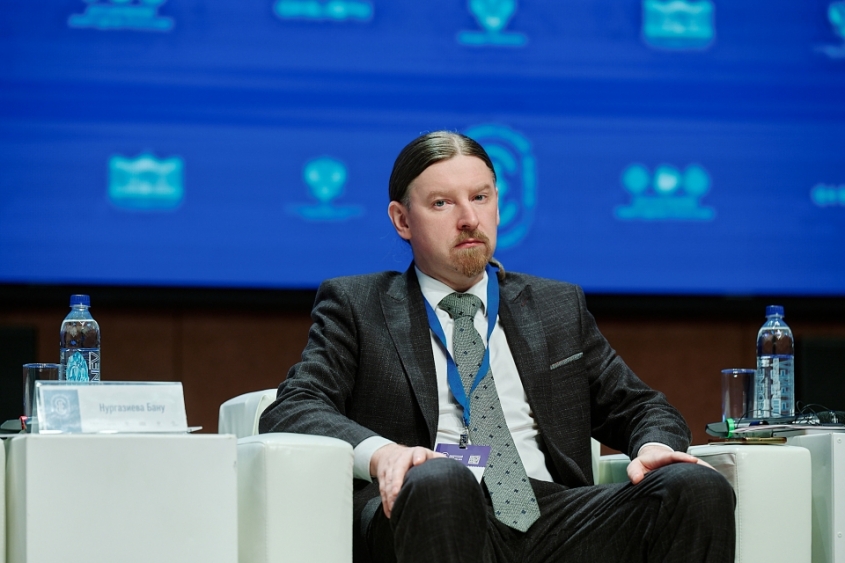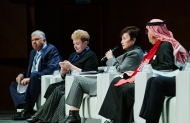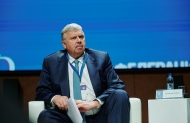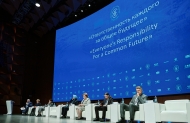
The theme “everyone’s responsibility for a common future” was the key at the panel session of the same name, organized by the Eurasian Peoples’ Assembly as part of the First Catherine Forum. The Forum took place in Moscow on December 12-13, 2023.
Along with other Assembly discussion platforms, this session aroused great interest among the participants. The moderator, leader of the Eurasian Peoples' Assembly Andrei Belianinov, structured the dialogue between the speakers in such a way as to reveal the most pressing problems of building a world order, technology development, international relations, and conditions for cooperation between peoples today.
One of the foreign speakers of the discussion was political scientist, Director of the Center for the Study of Integration “Northern Eurasia”, researcher at the Institute of Philosophy of the National Academy of Sciences of Belarus, expert of the Russian-Belarusian Expert Club Alexey Dzermant. He expressed his position on the challenges that the Eurasian and world communities face today. Those that require special attention and responsibility from society when making certain decisions.
Alexey Dzermant: “The emergence of artificial intelligence today is compared by some to the emergence of nuclear weapons and nuclear energy. Because humanity probably has not yet fully understood what we have and how it will change our lives. While there are many positives in any technology, there are and will be many negatives. A person can become psychologically dependent. Many jobs will be lost.
Artificial intelligence - we see - does not always develop predictably. And, perhaps, it will acquire qualities that we are not yet aware of. That is, there are many challenges facing humanity. And this is just one of them.
Another example is the development of genetic technologies, genetic engineering. We know that when a person gets such tools, someone will use them for good - for treatment, for improving life, for fighting some illnesses. And someone will think how to raise a breed of superhumans, how to make your wealth a pledge that your children and yourself will be better than everyone else. You'll be better physically, mentally. And you will pass it on by inheritance, while the others - who will not have such opportunities - will continue to be ordinary people, naturally, at a lower social stage.
You can list these challenges a lot - they converge now in this place, in this moment. And here the very question of shared responsibility arises.
Unfortunately, it so happened that the West failed to cope with global governance. The West and its leader are the United States. Conflicts and injustice have not decreased. On the contrary, it has increased because, unfortunately, the Western elite turned out to be irresponsible. Of course - I do not transfer this to the peoples, the population of these countries - there are many of our like-minded people there. But, alas, the elite did not build the world as a common house, they began to build a world divided into floors, where the highest have everything, and the lowest are content with the least. And in this sense, it is our common responsibility to ensure that these technologies, this new world, which is advancing uncontrollably, are more harmonious, more balanced.
In this sense, the main task for representatives of our civilizations, especially in Eurasia - Russian, Arab, Chinese, Indian, Islamic - is to find those approaches to the development of technology, to the development of the society of the future, which harmonized it, and not only served the caste of some chosen masters who want to rule the world and do not want to share power with anyone else.
How to do that? And this is where the moment of people's diplomacy comes into play. Its ideas, the philosophy of every civilization strives for exactly this - for harmony, for justice, for balance. And this is indeed the age-old wisdom that each of our peoples carries within them. This is a millennium of wisdom that we are ready to share with each other.
Who are the bearers of this wisdom? Representatives of these nations: people of culture, philosophers, artists, musicians. In a common dialogue, in the exchange of these ideas, we can find solutions that will eventually save humanity from this technological - let's say, some kind of madness. It can come if we pursue only the lust for profit or the lust for power.
And in this sense, it is no coincidence that we are now gathered in winter snow-covered Moscow, in the capital of Russia, in Great Russia. Why not by chance? Because throughout its history, Russia has indeed been the state, the civilization that has offered humanity solutions not only for itself, but for the entire world, for the entire planet, for all of humanity. It has shared technologies, resources, shared knowledge, opportunities.
In this sense, the idea of Russia as an ark is very important. Because we see how there is a shortage of resources, water, food shortage, somewhere there is a shortage of land, because warming is coming and the sea is coming in the coastal areas. And in this sense, now is the moment when we must realise that we need mutual help and support for each other.
It is necessary to develop technologies not in such a way that one person has this knowledge, but in way when he shares, helps, and collaborates. This is where our deepest opportunity and responsibility lies before our peoples and all humanity. I hope that we will take advantage of this opportunity, as the sages of all our peoples and all our countries taught!”
The first Catherine Forum was dedicated to the “Challenging Manifesto on permission to foreigners to settle in Russia” of Catherine II. Its attractive conditions contributed to the influx of foreign specialists from various fields of the economy to Russia. This document played an important role in Russian history, and 260 years after its release, it again proves the relevance of its idea: in the modern geopolitical situation, citizens of Western countries began to view Russia as a place for a new life - stable and based on traditional spiritual and moral values.
The organizers of the forum are the All-Russian public-state organization “Assembly of the Peoples of Russia” and the Federal National-Cultural Autonomy of Russian Germans with the support of the Presidential Council of the Russian Federation for Interethnic Relations, the Federal Agency for Nationalities Affairs.
The International Union of Non-Governmental Organizations “Eurasian Peoples' Assembly” acted as a partner of the First Catherine Forum and held three panel sessions at its site: “Everyone’s responsibility for a common future”, “Support for compatriots and friends of Russia abroad”, “Business diplomacy: from people’s trust to trust” economics".






